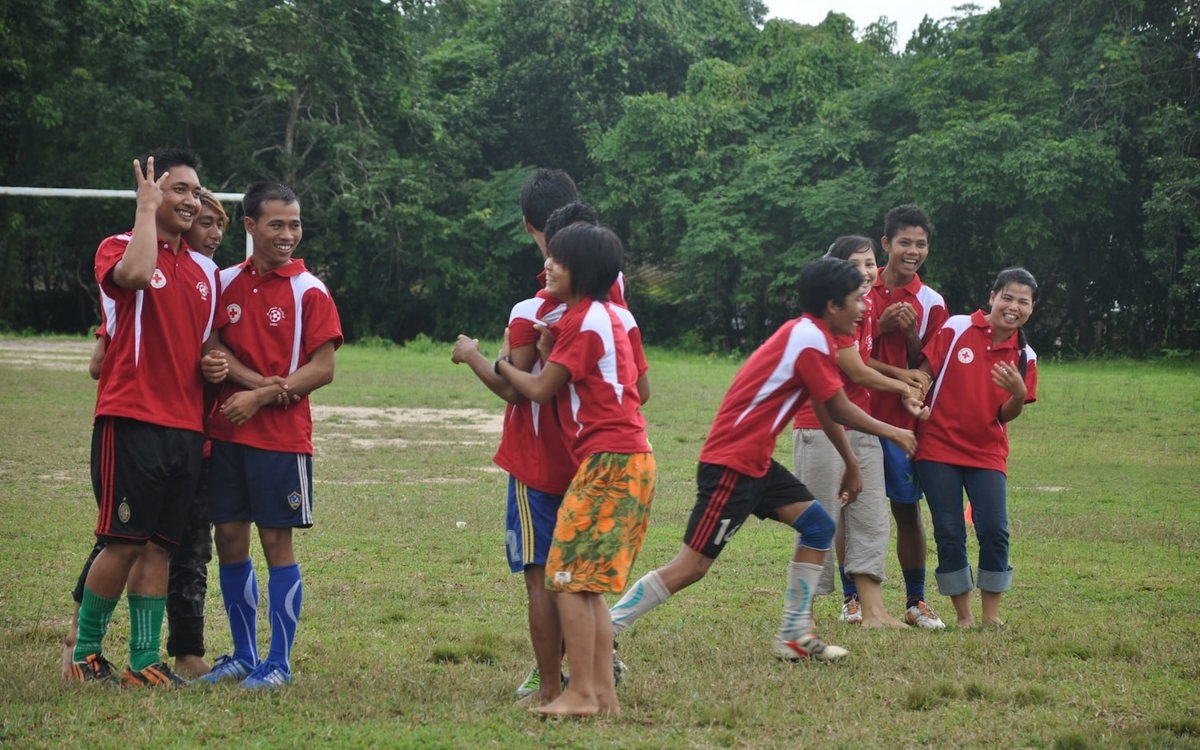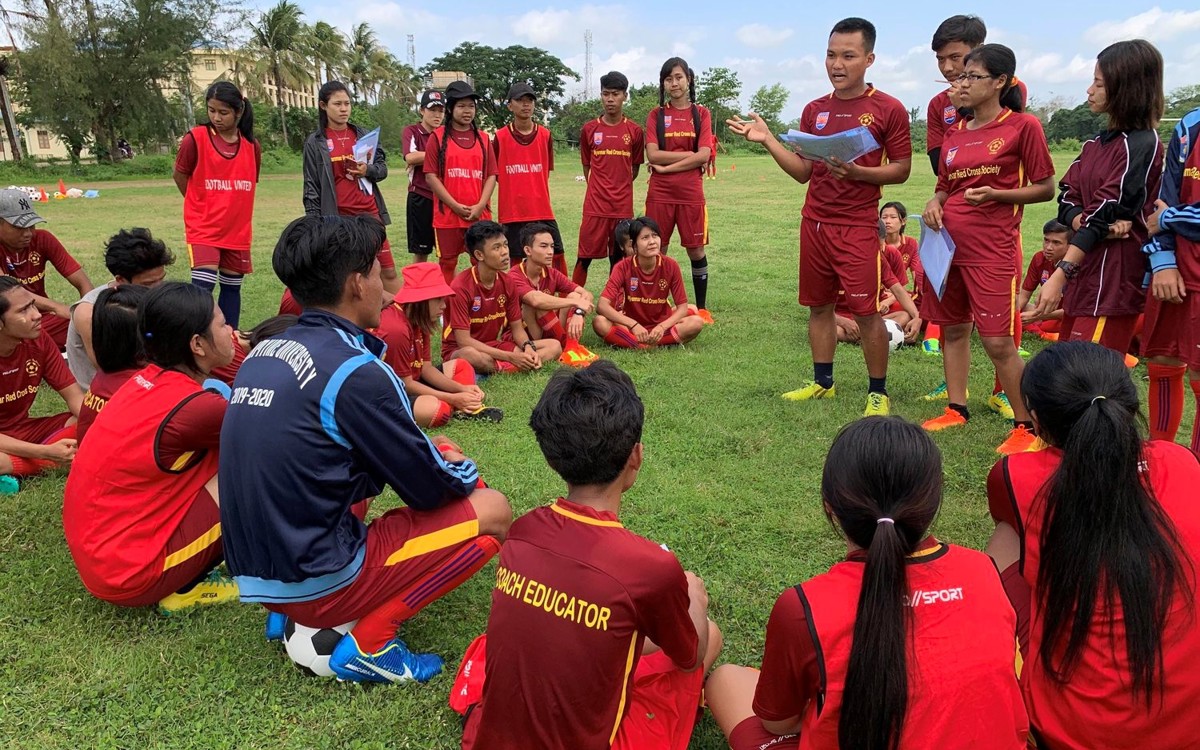How football training is supporting communities from Sydney to Myanmar. By Anne Bunde-Birouste, University of New South Wales, Australia

How football training is supporting communities from Sydney to Myanmar.
By Anne Bunde-Birouste, University of New South Wales, Australia
Football isn’t magic. But anyone who’s ever witnessed the passion it inspires could be forgiven for thinking it was. The memory of a favourite team beating the odds or a player triumphing over adversity; the sight of a stadium in raptures or an entire nation hypnotised by a cup final on their screens. It may not be magic, but it certainly seems to cast a spell on us.
This shared passion, unparalleled in its global reach, lies at the heart of Football United – a sport-based programme supporting young people living in divided or disadvantaged communities. Based at a university, and underpinned by robust research, it uses our common love of football as a tool to bring young people together, improve their wellbeing, and to empower, motivate and inspire.
When I founded Football United in 2006, my background wasn’t in football, but in health promotion and the social determinants of health. These ‘determinants’ are the non-medical factors that affect our health – and particularly those – often-unequal forces and factors that can shape how we live, grow, and age.
After working with communities uprooted or ruptured by conflict, it was clear to me that there were profound links between health and harmony. Not only is the mental and physical wellbeing of any community critical to its resilience, but good health is required if communities and individuals are to exercise their rights and entitlements. A lack of social cohesion, inclusion and belonging, meanwhile, can similarly undermine health, resilience, and peace. So, how does Football United make a difference?
Skills for life
At its most basic, Football United provides safe, free, accessible, and regular opportunities for young people living in divided or disadvantaged communities to come together to learn and play football. We do this by working with local schools to use their grounds and facilities, as well as organising community-based play and training in local parks and so on.
For many people living in low socioeconomic areas, access to organised sport can be limited or non-existent. Football United provides much-needed opportunities for recreational activity in an inclusive, structured, yet fun environment. It engages young people in regular and sustained physical activity, boosts confidence, bridges social divides, and builds networks of friends and peers.
But what’s really important to understand is that every single one of our programmes is purposefully designed to promote a series of essential life skills. In other words, when the kids get out onto the playing field, they don’t just learn how to play football, they also gain skills in communication, leadership, team-building, and the principles of fair play.
To give just one example, participants take part in a workshop in which some players are blindfolded and the rest of the team are asked to verbally guide them across the pitch and around various obstacles. Afterwards, we sit down and discuss the exercise – how it made them feel, what they learned, and how bad communication can lead to misunderstandings.
But Football United does more than simply teach leadership and team-building. It also creates chances for players to put these skills to use. The programme trains young people in coaching, facilitating, and leadership principles, with pathways in place for players to become coaches and programme leaders themselves. To date, the programme has trained over 500 young leaders, more than 60 of whom have gone on to become employees of Football United, leading social change programmes in their communities.

Football United in Myanmar
Football United is relatively unusual in being hosted at a university. This university base not only enables us to underpin everything we do with research and evaluation, we also integrate the programme into university teaching, learning, and community engagement.
One extraordinary story of this integration in action started with public health graduate student Tun Aung Shwe, a former doctor from Myanmar who had moved his family to Australia to escape a repressive military regime. As a student at the University of New South Wales, Tun volunteered for Football United and later became a programme officer, developing his PhD research on how sport can be used to promote positive social change. It was Tun who first suggested taking Football United to his former home country of Myanmar, where almost 50 years of military rule seemed finally to have come to an end in 2011.
With Tun Aung Shwe at the helm, and a seed grant from the university, Football United’s Myanmar programme began in earnest in 2013, in collaboration with the Myanmar Red Cross and the Ministry of Social Welfare. After decades of conflict in the country, the programme focused particularly on reconciliation through four key areas: life skills and youth development, social cohesion, resilience building for internally displaced populations, and disaster risk reduction, all supported by robust monitoring and evaluation.
Working with 19 different universities and across 65 Myanmar communities, the programme used youth-to-youth mentoring as a core approach: university students were trained as football coaches and engaged local school students in a variety of football-based activities designed to promote interaction between different communities. Later, when it became clear that communities needed to play a more active role in the programme’s implementation, Football United provided coaching training for local teachers and community volunteers, and brought them and the university coaches together.

In 2017, and with a grant from the UEFA Foundation, Football United set up a permanent Football for Peace Centre in Hpa-an in Kayin state. It was an incredible example of community engagement with the programme: a local business owner donated the land, while another local entrepreneur offered vehicles to clear it. One of Myamar’s most prominent architects donated the plans for an environmentally-focused set of buildings, while the local community provided support – and even meals - throughout every stage of its development.
The Centre became a platform for community-based activities in the area and a regional hub for social engagement, offering residential coach training, regional workshops, and a national youth forum. But things were about to get extremely difficult.
A humanitarian crisis
Everything in Myanmar changed dramatically in February 2021 when the military staged a coup. The ensuing violent crackdown by the junta on the civil opposition led many people to flee to areas controlled by armed ethnic groups. Kayin State, where the Football for Peace Centre is located, is one of the states where people have sought refuge, with many living in refugee camps on the Thai-Myanmar border.
As 2021 progressed, COVID also wreaked havoc on the citizens of Myanmar, as the military used its force to isolate people and prevent proper care and vaccines from reaching them. In 2022, UN High Commissioner Michelle Bachelet spoke of a growing humanitarian crisis, with systematic brutality by security forces inflaming pre-existing conflicts in different ethnic states. More than 14.4 million individuals are now thought to be in humanitarian need.
Football United will continue its work in Myanmar, thanks to the extraordinary dedication of staff and volunteers, ongoing support from our donors, and the key infrastructure that the Football United Peace Centre provides. Our activities have been carefully re-designed to meet some of the emerging psychological needs of Myanmar’s young people – such as trauma and recovery, resilience-building, and social integration in the most volatile circumstances.
Although the programme faces its toughest challenge yet, we believe that Football United will be more necessary than ever in providing psychological and emotional support, safe spaces for people to play and heal, and an increased sense of hope and unity to a generation of young people whose dreams of peace and freedom have been replaced by fear and uncertainty.
Dr Anne Bunde-Birouste is Adjunct Senior Lecturer at the School of Population Health at the University of New South Wales, Australia, and the Founder and CEO of Football United.
In light of the current crisis in Myanmar, this article has been modified to protect staff, volunteers and participants of Football United working the region. The photos accompanying this article date from before the recent coup and are courtesy of Football United.
In communities across the world, many people live alongside conflict and unrest. But how does this affect their mental health? Find out more in The Long Shadow and Living in Fear - two fascinating articles from The ACU Review's issue on public mental health.
